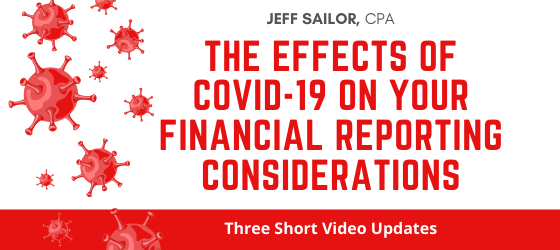
Guest Post: Relief for Audit Reporting


One of Western CPE’s most popular instructors, Jeff Sailor brings expertise and a singular flair to his coursework, designed to combat “boring CPE.” With 30 years accounting experience and more than 10 as an AICPA peer reviewer, he’s as knowledgeable as he is thoughtful about his presentation.
Read more about Jeff in our Instructor Spotlight and check out his CPE here.
On May 1, 2020 the Auditing Standards Board issued SAS 141, which made official the decisions made at their April 20th meeting. This update extends the effective date for audit standards 134-140, which were all to be effective for periods ending after December 15, 2020. This update extends the effective date for one year for audits of financial statements with periods ending after December 15, 2021.
So, what are SAS’s 134-140 all about? In effect, they are all about one topic: the audit report. SAS 134 makes significant changes to the format of the standard audit report. The AICPA has recently made a push for overall better communications and felt that the audit report could be improved.
The most notable change is to move the opinion paragraph to the beginning of the report. It also now requires a “Basis for Opinion” paragraph for all reports. In the past, that paragraph was only required for reports with a modified opinion. On a separate topic, it gives guidance for situations when auditors are engaged to report on key audit matters.
SAS 137 updates the auditor’s responsibilities with regard to other information contained in annual reports.
The remaining SAS updates further expound on the effect of the new report on various specialized areas and clean up the standards to incorporate the changes.
The ASB felt, that with the current challenges being faced by businesses with regard to the COVID-19 virus, allowing more time for the implementation of these new requirements would be prudent.
That said, auditors should use this additional time to understand the new requirements to be prepared for the extended implementation date. For those who are ready, the ASB has indicated that they would allow early implementation.
If you want to learn more about these updates, I will be discussing them in detail in my audit presentations this year.
Stay safe and healthy.

Jeff Sailor, CPA, received a master’s degree in accounting from the University of Florida. Upon graduation, he joined the auditing staff at Peat Marwick in Jacksonville, Florida, where he worked on a large number of national accounts. Jeff has managed his own accounting firm in Ocala, Florida, since 1984. During that time, he has also developed unique auditing approaches and auditing software.
Since 1992, Jeff has been teaching accounting and auditing courses he developed to combat traditional “boring CPE.” Using a variety of creative teaching methods sprinkled with humorous video spoofs, Jeff is able to combine his in-depth accounting insights with humor in high-energy presentations. He’s also adept at presenting complex topics in a very practical, easy-to-understand manner, thus earning him rave reviews for more than 20 years. Jeff currently presents seminars, webcasts, and in-house instruction for Western CPE. He’s also a featured speaker at national conferences as well as at state and regional meetings.
For more than 10 years, Jeff has served as an AICPA peer reviewer, focusing on small firms and sole practitioners. He also served on the Resource Committee for the Private Company Financial Reporting Committee (PCFRC). Jeff has spoken at two NASBA national conferences on how to make education more engaging for practitioners.
DIG DEEPER:
How The $3.5 Trillion Budget Blueprint Could Impact Your Clients
The new reporting requirements on brokers are addressed in Section 80603 of the bill. “Broker,” by definition in Sec. 6045 (c)(1), is expanded to include “any other person who (for a consideration) regularly acts as a middleman with respect to property or services…A person shall not be treated as a broker with respect to activities consisting of managing a farm on behalf of another person.” In turn, the bill defines a “digital asset” as “any digital representation of value which is recorded on a cryptographically secured distributed ledger or any similar technology as specified by the Secretary.


